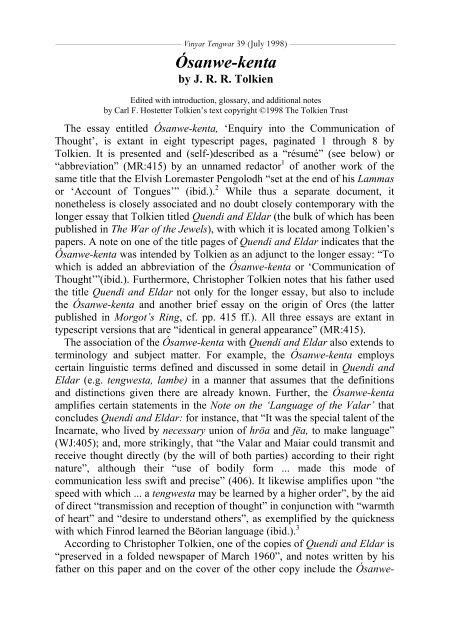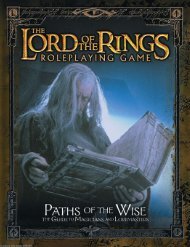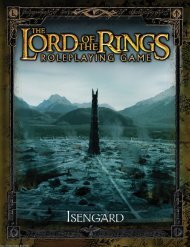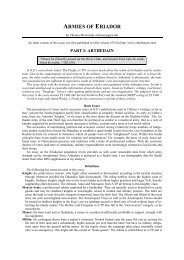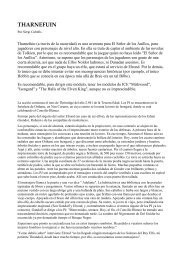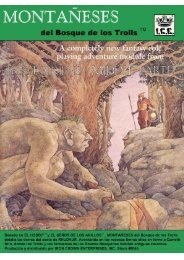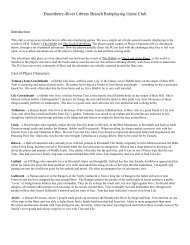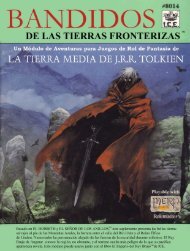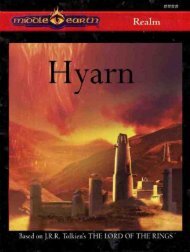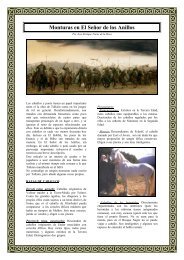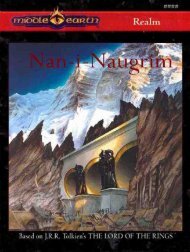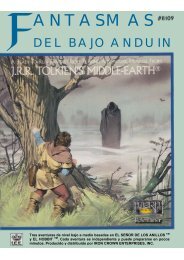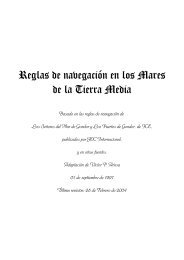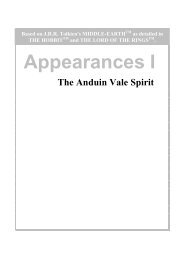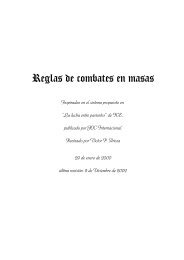Vinyar Tengwar 39 - Fan Modules - Free
Vinyar Tengwar 39 - Fan Modules - Free
Vinyar Tengwar 39 - Fan Modules - Free
You also want an ePaper? Increase the reach of your titles
YUMPU automatically turns print PDFs into web optimized ePapers that Google loves.
————————————— <strong>Vinyar</strong> <strong>Tengwar</strong> <strong>39</strong> (July 1998) ———————————<br />
Ósanwe-kenta<br />
by J. R. R. Tolkien<br />
Edited with introduction, glossary, and additional notes<br />
by Carl F. Hostetter Tolkien’s text copyright ©1998 The Tolkien Trust<br />
The essay entitled Ósanwe-kenta, ‘Enquiry into the Communication of<br />
Thought’, is extant in eight typescript pages, paginated 1 through 8 by<br />
Tolkien. It is presented and (self-)described as a “résumé” (see below) or<br />
“abbreviation” (MR:415) by an unnamed redactor 1 of another work of the<br />
same title that the Elvish Loremaster Pengolodh “set at the end of his Lammas<br />
or ‘Account of Tongues’” (ibid.). 2 While thus a separate document, it<br />
nonetheless is closely associated and no doubt closely contemporary with the<br />
longer essay that Tolkien titled Quendi and Eldar (the bulk of which has been<br />
published in The War of the Jewels), with which it is located among Tolkien’s<br />
papers. A note on one of the title pages of Quendi and Eldar indicates that the<br />
Ósanwe-kenta was intended by Tolkien as an adjunct to the longer essay: “To<br />
which is added an abbreviation of the Ósanwe-kenta or ‘Communication of<br />
Thought’”(ibid.). Furthermore, Christopher Tolkien notes that his father used<br />
the title Quendi and Eldar not only for the longer essay, but also to include<br />
the Ósanwe-kenta and another brief essay on the origin of Orcs (the latter<br />
published in Morgot’s Ring, cf. pp. 415 ff.). All three essays are extant in<br />
typescript versions that are “identical in general appearance” (MR:415).<br />
The association of the Ósanwe-kenta with Quendi and Eldar also extends to<br />
terminology and subject matter. For example, the Ósanwe-kenta employs<br />
certain linguistic terms defined and discussed in some detail in Quendi and<br />
Eldar (e.g. tengwesta, lambe) in a manner that assumes that the definitions<br />
and distinctions given there are already known. Further, the Ósanwe-kenta<br />
amplifies certain statements in the Note on the ‘Language of the Valar’ that<br />
concludes Quendi and Eldar: for instance, that “It was the special talent of the<br />
Incarnate, who lived by necessary union of hröa and fëa, to make language”<br />
(WJ:405); and, more strikingly, that “the Valar and Maiar could transmit and<br />
receive thought directly (by the will of both parties) according to their right<br />
nature”, although their “use of bodily form ... made this mode of<br />
communication less swift and precise” (406). It likewise amplifies upon “the<br />
speed with which ... a tengwesta may be learned by a higher order”, by the aid<br />
of direct “transmission and reception of thought” in conjunction with “warmth<br />
of heart” and “desire to understand others”, as exemplified by the quickness<br />
with which Finrod learned the Bëorian language (ibid.). 3<br />
According to Christopher Tolkien, one of the copies of Quendi and Eldar is<br />
“preserved in a folded newspaper of March 1960”, and notes written by his<br />
father on this paper and on the cover of the other copy include the Ósanwe-
————————————— <strong>Vinyar</strong> <strong>Tengwar</strong> <strong>39</strong> (July 1998) ———————————<br />
kenta among the Appendices to Quendi and Eldar (MR:415). Christopher<br />
concludes that this complex of material, including the Ósanwe-kenta, “was<br />
thus in being when the newspaper was used for this purpose, and although, as<br />
in other similar cases, this does not provide a perfectly certain terminus ad<br />
quem, there seems to be no reason to doubt that it belongs to 1959-60” (ibid.).<br />
The eight typescript pages presented here appear to comprise the sole extant<br />
text of the Ósanwe-kenta; if it was preceded by any typescript or manuscript<br />
versions, they have apparently not been preserved. In the top margin of the<br />
first of these pages, Tolkien has written the three lines of its present title in<br />
ink. He has also numbered the first seven pages in the upper right-hand corner<br />
by hand, and written the notation “Ósanwe” to the left of the numeral on each<br />
of these pages, also in ink; but the page number and notation are typed in the<br />
same positions on the eighth page. This suggests that Tolkien may have<br />
paused, or perhaps originally concluded the essay, somewhere on the seventh<br />
page, and written the short title and page number on those pages he had typed<br />
at that point, before the eighth page was begun. If so, he may have done so at<br />
the break on the seventh page indicated by a blank space before the paragraph<br />
beginning “If we speak last of the ‘folly’ of Manwë”. The typescript has also<br />
been emended at points by Tolkien in ink, chiefly in correction of<br />
typographical errors, though on a few occasions supplying a change of<br />
wording. Save in a very few instances these changes have been incorporated<br />
silently in this edition.<br />
In this edition, Tolkien’s text has also been reorganized slightly in the<br />
matter of notes. On the first page of the typescript (only) Tolkien used<br />
numbered footnotes, but as throughout Quendi and Eldar, elsewhere in the<br />
Ósanwe-kenta he at points interrupts his text with notes, typically typed on the<br />
line following, or within a few lines of, the notation mark, even where this<br />
interrupts a sentence (cf. WJ:359). Christopher Tolkien’s practice in editing<br />
Quendi and Eldar of collecting Tolkien’s notes at the end of the essay,<br />
distinguishing them from editorial notes by referring to them in the text with<br />
Note 1, Note 2, etc. in parentheses, has been adopted here for most of these<br />
notes. However, seven very brief notes, which simply supply Quenya glosses<br />
of terms under discussion (those for sanwe-latya, sáma, láta, indo, pahta,<br />
avanir, and aquapahtie), have been placed in the main text parenthetically.<br />
A brief editorial glossary of the Elvish forms encountered in the Ósanwekenta<br />
has been supplied following Tolkien’s notes, as a convenient place for<br />
citing further information relevant to them from other texts (especially Quendi<br />
and Eldar, various texts in Morgot’s Ring, and The Etymologies) and for most<br />
of the specifically linguistic editorial commentary.<br />
I am grateful to Christopher Tolkien for providing this text for publication<br />
in <strong>Vinyar</strong> <strong>Tengwar</strong>, and to Christopher Gilson, Wayne Hammond, Christina
————————————— <strong>Vinyar</strong> <strong>Tengwar</strong> <strong>39</strong> (July 1998) ———————————<br />
Scull, Arden Smith, and Patrick Wynne for their assistance in preparing this<br />
edition.<br />
Ósanwe-kenta 4<br />
”Enquiry into the Communication of Thought”<br />
(résumé of Pengolodh’s discussion)<br />
At the end of the Lammas Pengolodh discusses briefly direct thoughttransmission<br />
(sanwe-latya “thought-opening”), making several assertions<br />
about it, which are evidently dependent upon theories and observations of the<br />
Eldar elsewhere treated at length by Elvish loremasters. They are concerned<br />
primarily with the Eldar and the Valar (including the lesser Maiar of the same<br />
order). Men are not specially considered, except in so far as they are included<br />
in general statements about the Incarnates (Mirröanwi). Of them Pengolodh<br />
says only: “Men have the same faculty as the Quendi, but it is in itself weaker,<br />
and is weaker in operation owing to the strength of the hröa, over which most<br />
men have small control by the will”.<br />
Pengolodh includes this matter primarily owing to its connexion with<br />
tengwesta. But he is also concerned as an historian to examine the relations of<br />
Melkor and his agents with the Valar and the Eruhíni, 5 though this also has a<br />
connexion with “language”, since, as he points out, this, the greatest of the<br />
talents of the Mirröanwi, has been turned by Melkor to his own greatest<br />
advantage.<br />
Pengolodh says that all minds (sáma, pl. sámar) are equal in status, though<br />
they differ in capacity and strength. A mind by its nature perceives another<br />
mind directly. But it cannot perceive more than the existence of another mind<br />
(as something other than itself, though of the same order) except by the will of<br />
both parties (Note 1). The degree of will, however, need not be the same in<br />
both parties. If we call one mind G (for guest or comer) and the other H (for<br />
host or receiver), then G must have full intention to inspect H or to inform it.<br />
But knowledge may be gained or imparted by G, even when H is not seeking<br />
or intending 6 to impart or to learn: the act of G will be effective, if H is simply<br />
“open” (láta; látie “openness”). This distinction, he says, is of the greatest<br />
importance.<br />
“Openness” is the natural or simple state (indo) of a mind that is not<br />
otherwise engaged (Note 2). In “Arda Unmarred” (that is, in ideal conditions<br />
free from evil) 7 openness would be the normal state. Nonetheless any mind<br />
may be closed (pahta). This requires an act of conscious will: Unwill (avanir).<br />
It may be made against G, against G and some others, or be a total retreat into<br />
“privacy” (aquapahtie).<br />
Though in “Arda Unmarred” openness is the normal state, every mind has,<br />
from its first making as an individual, the right to close; and it has absolute
————————————— <strong>Vinyar</strong> <strong>Tengwar</strong> <strong>39</strong> (July 1998) ———————————<br />
power to make this effective by will. Nothing can penetrate the barrier of<br />
Unwill (Note 3).<br />
All these things, says Pengolodh, are true of all minds, from the Ainur in<br />
the presence of Eru, or the great Valar such as Manwë and Melkor, to the<br />
Maiar in Eä, and down to the least of the Mirröanwi. But different states bring<br />
in limitations, which are not fully controlled by the will.<br />
The Valar entered into Eä and Time of free will, and they are now in Time,<br />
so long as it endures. They can perceive nothing outside Time, save by<br />
memory of their existence before it began: they can recall the Song and the<br />
Vision. They are, of course, open to Eru, but they cannot of their own will<br />
“see” any part of His mind. They can open themselves to Eru in entreaty, and<br />
He may then reveal His thought to them (Note 4).<br />
The Incarnates have by the nature of sáma the same faculties; but their<br />
perception is dimmed by the hröa, for their fëa is united to their hröa and its<br />
normal procedure is through the hröa, which is in itself part of Eä, without<br />
thought. The dimming is indeed double; for thought has to pass one mantle of<br />
hröa and penetrate another. For this reason in Incarnates transmission of<br />
thought requires strengthening to be effective. Strengthening can be by<br />
affinity, by urgency, or by authority.<br />
Affinity may be due to kinship; for this may increase the likeness of hröa to<br />
hröa, and so of the concerns and modes of thought of the indwelling fëar,<br />
kinship is also normally accompanied by love and sympathy. Affinity may<br />
come simply from love and friendship, which is likeness or affinity of fëa to<br />
fëa.<br />
Urgency is imparted by great need of the “sender” (as in joy, grief or fear);<br />
and if these things are in any degree shared by the “receiver” the thought is the<br />
clearer received. Authority may also lend force to the thought of one who has a<br />
duty towards another, or of any ruler who has a right to issue commands or to<br />
seek the truth for the good of others.<br />
These causes may strengthen the thought to pass the veils and reach a<br />
recipient mind. But that mind must remain open, and at the least passive. If,<br />
being aware that it is addressed, it then closes, no urgency or affinity will<br />
enable the sender’s thought to enter.<br />
Lastly, tengwesta has also become an impediment. 8 It is in Incarnates<br />
clearer and more precise than their direct reception of thought. By it also they<br />
can communicate easily with others, when no strength is added to their<br />
thought: as, for example, when strangers first meet. And, as we have seen, the<br />
use of “language” soon becomes habitual, so that the practice of ósanwe<br />
(interchange of thought) is neglected and becomes more difficult. Thus we see<br />
that the Incarnate tend more and more to use or to endeavour to use ósanwe<br />
only in great need and urgency, and especially when lambe is unavailing. As<br />
when the voice cannot be heard, which comes most often because of distance.
————————————— <strong>Vinyar</strong> <strong>Tengwar</strong> <strong>39</strong> (July 1998) ———————————<br />
For distance in itself offers no impediment whatever to ósanwe. But those who<br />
by affinity might well use ósanwe will use lambe when in proximity, by habit<br />
or preference. Yet we may mark also how the “affine” may more quickly<br />
understand the lambe that they use between them, and indeed all that they<br />
would say is not put into words. With fewer words they come swifter to a<br />
better understanding. There can be no doubt that here ósanwe is also often<br />
taking place; for the will to converse in lambe is a will to communicate<br />
thought, and lays the minds open. It may be, of course, that the two that<br />
converse know already part of the matter and the thought of the other upon it,<br />
so that only allusions dark to the stranger need be made; but this is not always<br />
so. The affine will reach an understanding more swiftly than strangers upon<br />
matters that neither have before discussed, and they will more quickly perceive<br />
the import of words that, however numerous, well-chosen, and precise, must<br />
remain inadequate.<br />
The hröa and tengwesta have inevitably some like effect upon the Valar, if<br />
they assume bodily raiment. The hröa will to some degree dim in force and<br />
precision the sending of the thought, and if the other be also embodied the<br />
reception of it. If they have acquired the habit of tengwesta, as some may who<br />
have acquired the custom of being arrayed, then this will reduce the practice of<br />
ósanwe. But these effects are far less than in the case of the Incarnate.<br />
For the hröa of a Vala, even when it has become customary, is far more<br />
under the control of the will. The thought of the Valar is far stronger and more<br />
penetrant. And so far as concerns their dealings one with another, the affinity<br />
between the Valar is greater than the affinity between any other beings; so that<br />
the use of tengwesta or lambe has never become imperative, and only with<br />
some has it become a custom and preference. And as for their dealings with all<br />
other minds in Eä, their thought often has the highest authority, and the<br />
greatest urgency. (Note 5)<br />
Pengolodh then proceeds to the abuses of sanwe. “For” he says, “some<br />
who have read so far, may already have questioned my lore, saying: This<br />
seems not to accord with the histories. If the sáma were inviolable by force,<br />
how could Melkor have deceived so many minds and enslaved so many? Or is<br />
it not rather true that the sáma may be protected by greater strength but<br />
captured also by greater strength? Wherefore Melkor, the greatest, and even to<br />
the last possessing the most fixed, determined and ruthless will, could<br />
penetrate the minds of the Valar, but withhold himself from them, so that even<br />
Manwë in dealing with him may seem to us at times feeble, unwary, and<br />
deceived. Is this not so?”<br />
“I say that it is not so. Things may seem alike, but if they are in kind<br />
wholly different they must be distinguished. Foresight which is prevision, 9<br />
and forecasting 10 which is opinion made by reasoning upon present evidence,<br />
may be identical in their prediction, but they are wholly different in mode, and
————————————— <strong>Vinyar</strong> <strong>Tengwar</strong> <strong>39</strong> (July 1998) ———————————<br />
they should be distinguished by loremasters, even if the daily language of both<br />
Elves and Men gives them the same name as departments of wisdom”. (Note<br />
6)<br />
In like manner, extortion of the secrets of a mind may seem to come from<br />
reading it by force in despite of its unwill, for the knowledge gained may at<br />
times appear to be as complete as any that could be obtained. Nonetheless it<br />
does not come from penetration of the barrier of unwill.<br />
There is indeed no axan that the barrier should not be forced, for it is únat,<br />
a thing impossible to be or to be done, and the greater the force exerted, the<br />
greater the resistance of the unwill. 11 But it is an axan universal that none shall<br />
directly by force or indirectly by fraud take from another what he has a right to<br />
hold and keep as his own.<br />
Melkor repudiated all axani. He would also abolish (for himself) all únati<br />
if he could. Indeed in his beginning and the days of his great might the most<br />
ruinous of his violences came from his endeavour so to order Eä that there<br />
were no limits or obstacles to his will. But this he could not do. The únati<br />
remained, a perpetual reminder of the existence of Eru and His invincibility, a<br />
reminder also of the co-existence with himself of other beings (equal in<br />
descent if not in power) impregnable by force. From this proceeds his<br />
unceasing and unappeasable rage.<br />
He found that the open approach of a sáma of power and great force of<br />
will was felt by a lesser sáma as an immense pressure, accompanied by fear.<br />
To dominate by weight of power and fear was his delight; but in this case he<br />
found them unavailing: fear closed the door faster. Therefore he tried deceit<br />
and stealth.<br />
Here he was aided by the simplicity of those unaware of evil, or not yet<br />
accustomed to beware of it. And for that reason it was said above that the<br />
distinction of openness and active will to entertain was of great importance.<br />
For he would come by stealth to a mind open and unwary, hoping to learn<br />
some part of its thought before it closed, and still more to implant in it his own<br />
thought, to deceive it and win it to his friendship. His thought was ever the<br />
same, though varied to suit each case (so far as he understood it): he was<br />
above all benevolent; he was rich and could give any gift that they desired to<br />
his friends; he had a special love for the one that he addressed; but he must be<br />
trusted.<br />
In this way he won entry into many minds, removing their unwill, and<br />
unlocking the door by the only key, though his key was counterfeit. Yet this<br />
was not what he most desired, the conquest of the recalcitrant, the enslavement<br />
of his enemies. Those who listened and did not close the door were too often<br />
already inclined to his friendship; some (according to their measure) had<br />
already entered on paths like his own, and listened because they hoped to learn<br />
and receive from him things that would further their own purposes. (So it was
————————————— <strong>Vinyar</strong> <strong>Tengwar</strong> <strong>39</strong> (July 1998) ———————————<br />
with those of the Maiar who first and earliest fell under his domination. They<br />
were already rebels, but lacking Melkor’s power and ruthless will they<br />
admired him, and saw in his leadership hope of effective rebellion.) But those<br />
who were yet simple and uncorrupted in “heart” (Note 7) were at once aware<br />
of his entry, and if they listened to the warning of their hearts, ceased to listen,<br />
ejected him, and closed the door. It was such as these that Melkor most desired<br />
to overcome: his enemies, for to him all were enemies who resisted him in the<br />
least thing or claimed anything whatsoever as their own and not his. 12<br />
Therefore he sought means to circumvent the únat and the unwill. And this<br />
weapon he found in “language”. For we speak now of the Incarnate, the<br />
Eruhíni whom he most desired to subjugate in Eru’s despite. Their bodies<br />
being of Eä are subject to force; and their spirits, being united to their bodies<br />
in love and solicitude, are subject to fear on their behalf. And their language,<br />
though it comes from the spirit or mind, operates through and with the body: it<br />
is not the sáma nor its sanwe, but it may express the sanwe in its mode and<br />
according to its capacity. Upon the body and upon the indweller, therefore,<br />
such pressure and such fear may be exerted that the incarnate person may be<br />
forced to speak.<br />
So Melkor thought in the darkness of his forethought long ere we awoke.<br />
For in days of old, when the Valar instructed the Eldar new-come to Aman<br />
concerning the beginning of things and the enmity of Melkor, Manwë himself<br />
said to those who would listen: “Of the Children of Eru Melkor knew less than<br />
his peers, giving less heed to what he might have learned, as we did, in the<br />
Vision of their Coming. Yet, as we now fear since we know you in your true<br />
being, to everything that might aid his designs for mastery his mind was keen<br />
to attend, and his purpose leaped forward swifter than ours, being bound by no<br />
axan. From the first he was greatly interested in “language”, that talent that the<br />
Eruhíni would have by nature; but we did not at once perceive the malice in<br />
this interest, for many of us shared it, and Aule above all. But in time we<br />
discovered that he had made a language for those who served him; and he has<br />
learned our tongue with ease. He has great skill in this matter. Beyond doubt<br />
he will master all tongues, even the fair speech of the Eldar. Therefore, if ever<br />
you should speak with him beware!”<br />
“Alas!” says Pengolodh, “in Valinor Melkor used the Quenya with such<br />
mastery that all the Eldar were amazed, for his use could not be bettered,<br />
scarce equalled even, by the poets and the loremasters”.<br />
Thus by deceit, by lies, by torment of the body and the spirit, by the threat<br />
of torment to others well loved, or by the sheer terror of his presence, Melkor<br />
ever sought to force the Incarnate that fell into his power, or came within his<br />
reach, to speak and to tell him all that he would know. But his own Lie begot<br />
an endless progeny of lies.
————————————— <strong>Vinyar</strong> <strong>Tengwar</strong> <strong>39</strong> (July 1998) ———————————<br />
By this means he has destroyed many, he has caused treacheries untold,<br />
and he has gained knowledge of secrets to his great advantage and the undoing<br />
of his enemies. But this is not by entering the mind, or by reading it as it is, in<br />
its despite. Nay, for great though the knowledge that he gained, behind the<br />
words (even of those in fear and torment) dwells ever the sáma inviolable: the<br />
words are not in it, though they may proceed from it (as cries from behind a<br />
locked door); they must be judged and assessed for what truth may be in them.<br />
Therefore, the Liar says that all words are lies: all things that he hears are<br />
threaded through with deceit, with evasions, hidden meanings, and hate. In this<br />
vast network he himself enmeshed struggles and rages, gnawed by suspicion,<br />
doubt, and fear. Not so would it have been, if he could have broken the barrier,<br />
and seen the heart as it is in its truth unveiled.<br />
If we speak last of the “folly” of Manwë and the weakness and unwariness<br />
of the Valar, let us beware how we judge. In the histories, indeed, we may be<br />
amazed and grieved to read how (seemingly) Melkor deceived and cozened<br />
others, and how even Manwë appears at times almost a simpleton compared<br />
with him: as if a kind but unwise father were treating a wayward child who<br />
would assuredly in time perceive the error of his ways. Whereas we, looking<br />
on and knowing the outcome, see now that Melkor knew well the error of his<br />
ways, but was fixed in them by hate and pride beyond return. He could read<br />
the mind of Manwë, for the door was open; but his own mind was false and<br />
even if the door seemed open, there were doors of iron within closed for ever.<br />
How otherwise would you have it? Should Manwë and the Valar meet<br />
secrecy with subterfuge, treachery with falsehood, lies with more lies? If<br />
Melkor would usurp their rights, should they deny his? Can hate overcome<br />
hate? Nay, Manwë was wiser; or being ever open to Eru he did His will, which<br />
is more than wisdom. He was ever open because he had nothing to conceal, no<br />
thought that it was harmful for any to know, if they could comprehend it.<br />
Indeed Melkor knew his will without questioning it; and he knew that Manwë<br />
was bound by the commands and injunctions of Eru, and would do this or<br />
abstain from that in accordance with them, always, even knowing that Melkor<br />
would break them as it suited his purpose. Thus the merciless will ever count<br />
on mercy, and the liars make use of truth; for if mercy and truth are withheld<br />
from the cruel and the lying, they have ceased to be honoured. 13<br />
Manwë could not by duress attempt to compel Melkor to reveal his thought<br />
and purposes, or (if he used words) to speak the truth. If he spoke and said:<br />
this is true, he must be believed until proved false; if he said: this I will do, as<br />
you bid, he must be allowed the opportunity to fulfill his promise. (Note 8)<br />
The force and restraint that were used upon Melkor by the united power of<br />
all the Valar, were not used to extort confession (which was needless); nor to<br />
compel him to reveal his thought (which was unlawful, even if not vain). He<br />
was made captive as a punishment for his evil deeds, under the authority of the
————————————— <strong>Vinyar</strong> <strong>Tengwar</strong> <strong>39</strong> (July 1998) ———————————<br />
King. So we may say; but it were better said that he was deprived for a term,<br />
fixed by promise, of his power to act, so that he might halt and consider<br />
himself, and have thus the only chance that mercy could contrive of<br />
repentance and amendment. For the healing of Arda indeed, but for his own<br />
healing also. Melkor had the right to exist, and the right to act and use his<br />
powers. Manwë had the authority to rule and to order the world, so far as he<br />
could, for the well-being of the Eruhíni; but if Melkor would repent and return<br />
to the allegiance of Eru, he must be given his freedom again. He could not be<br />
enslaved, or denied his part. The office of the Elder King was to retain all his<br />
subjects in the allegiance of Eru, or to bring them back to it, and in that<br />
allegiance to leave them free.<br />
Therefore not until the last, and not then except by the express command of<br />
Eru and by His power, was Melkor thrown utterly down and deprived for ever<br />
of all power to do or to undo.<br />
Who among the Eldar hold that the captivity of Melkor in Mandos (which<br />
was achieved by force) was either unwise or unlawful? Yet the resolve to<br />
assault Melkor, not merely to withstand him, to meet violence with wrath to<br />
the peril of Arda, was taken by Manwë only with reluctance. And consider:<br />
what good in this case did even the lawful use of force accomplish? It<br />
removed him for a while and relieved Middle-earth from the pressure of his<br />
malice, but it did not uproot his evil, for it could not do so. Unless, maybe,<br />
Melkor had indeed repented. (Note 9) But he did not repent, and in humiliation<br />
he became more obdurate: more subtle in his deceits, more cunning in his lies,<br />
crueller and more dastardly in his revenge. The weakest and most imprudent<br />
of all the actions of Manwë, as it seems to many, was the release of Melkor<br />
from captivity. From this came the greatest loss and harm: the death of the<br />
Trees, and the exile and the anguish of the Noldor. Yet through this suffering<br />
there came also, as maybe in no other way could it have come, the victory of<br />
the Elder Days: the downfall of Angband and the last overthrow of Melkor.<br />
Who then can say with assurance that if Melkor had been held in bond less<br />
evil would have followed? Even in his diminishment the power of Melkor is<br />
beyond our calculation. Yet some ruinous outburst of his despair is not the<br />
worst that might have befallen. The release was according to the promise of<br />
Manwë. If Manwë had broken this promise for his own purposes, even though<br />
still intending “good”, he would have taken a step upon the paths of Melkor.<br />
That is a perilous step. In that hour and act he would have ceased to be the<br />
vice-gerent of the One, becoming but a king who takes advantage over a rival<br />
whom he has conquered by force. Would we then have the sorrows that indeed<br />
befell; or would we have the Elder King lose his honour, and so pass, maybe,<br />
to a world rent between two proud lords striving for the throne? Of this we<br />
may be sure, we children of small strength: any one of the Valar might have<br />
taken the paths of Melkor and become like him: one was enough.
————————————— <strong>Vinyar</strong> <strong>Tengwar</strong> <strong>39</strong> (July 1998) ———————————<br />
Author’s Notes to the Ósanwe-kenta<br />
Note 1<br />
Here níra (“will” as a potential or faculty) since the minimum requirement<br />
is that this faculty shall not be exerted in denial; action or an act of will is<br />
nirme; as sanwe “Thought” or “a thought” is the action or an act of sáma.<br />
Note 2<br />
It may be occupied with thinking and inattentive to other things; it may be<br />
“turned towards Eru”; it may be engaged in “thought-converse” with a third<br />
mind. Pengolodh says: “Only great minds can converse with more than one<br />
other at the same time; several may confer, but then at one time only one is<br />
imparting, while the others receive”.<br />
Note 3<br />
“No mind can, however, be closed against Eru, either against His<br />
inspection or against His message. The latter it may not heed, but it cannot say<br />
it did not receive it”.<br />
Note 4<br />
Pengolodh adds: “Some say that Manwë, by a special grace to the King,<br />
could still in a measure perceive Eru; others more probably, that he remained<br />
nearest to Eru, and Eru was most ready to hear and answer him”.<br />
Note 5<br />
Here Pengolodh adds a long note on the use of hröar by the Valar. In brief<br />
he says that though in origin a “self-arraying”, it may tend to approach the<br />
state of “incarnation”, especially with the lesser members of that order (the<br />
Maiar). “It is said that the longer and the more the same hröa is used, the<br />
greater is the bond of habit, and the less do the ‘self-arrayed’ desire to leave it.<br />
As raiment may soon cease to be adornment, and becomes (as is said in the<br />
tongues of both Elves and Men) a ‘habit’, a customary garb. Or if among<br />
Elves and Men it be worn to mitigate heat or cold, it soon makes the clad body<br />
less able to endure these things when naked”. Pengolodh also cites the opinion<br />
that if a “spirit” (that is, one of those not embodied by creation) uses a hröa for<br />
the furtherance of its personal purposes, or (still more) for the enjoyment of<br />
bodily faculties, it finds it increasingly difficult to operate without the hröa.<br />
The things that are most binding are those that in the Incarnate have to do with<br />
the life of the hröa itself, its sustenance and its propagation. Thus eating and<br />
drinking are binding, but not the delight in beauty of sound or form. Most<br />
binding is begetting or conceiving.<br />
“We do not know the axani (laws, rules, as primarily proceeding from Eru)<br />
that were laid down upon the Valar with particular reference to their state, but<br />
it seems clear that there was no axan against these things. Nonetheless it
————————————— <strong>Vinyar</strong> <strong>Tengwar</strong> <strong>39</strong> (July 1998) ———————————<br />
appears to be an axan, or maybe necessary consequence, that if they are done,<br />
then the spirit must dwell in the body that it used, and be under the same<br />
necessities as the Incarnate. The only case that is known in the histories of the<br />
Eldar is that of Melian who became the spouse of King Elu-thingol. This<br />
certainly was not evil or against the will of Eru, and though it led to sorrow,<br />
both Elves and Men were enriched.<br />
‘The great Valar do not do these things: they beget not, neither do they eat<br />
and drink, save at the high asari, in token of their lordship and indwelling of<br />
Arda, and for the blessing of the sustenance of the Children. Melkor alone of<br />
the Great became at last bound to a bodily form; but that was because of the<br />
use that he made of this in his purpose to become Lord of the Incarnate, and of<br />
the great evils that he did in the visible body. Also he had dissipated his native<br />
powers in the control of his agents and servants, so that he became in the end,<br />
in himself and without their support, a weakened thing, consumed by hate and<br />
unable to restore himself from the state into which he had fallen. Even his<br />
visible form he could no longer master, so that its hideousness could not any<br />
longer be masked, and it showed forth the evil of his mind. So it was also with<br />
even some of his greatest servants, as in these later days we see: they became<br />
wedded to the forms of their evil deeds, and if these bodies were taken from<br />
them or destroyed, they were nullified, until they had rebuilt a semblance of<br />
their former habitations, with which they could continue the evil courses in<br />
which they had become fixed”. (Pengolodh here evidently refers to Sauron in<br />
particular, from whose arising he fled at last from Middle-earth. But the first<br />
destruction of the bodily form of Sauron was recorded in the histories of the<br />
Elder Days, in the Lay of Leithian.)<br />
Note 6<br />
Pengolodh here elaborates (though it is not necessary for his argument) this<br />
matter of “foresight”. No mind, he asserts, knows what is not in it. All that it<br />
has experienced is in it, though in the case of the Incarnate, dependent upon<br />
the instruments of the hröa, some things may be “forgotten”, not immediately<br />
available for recollection. But no part of the “future” is there, for the mind<br />
cannot see it or have seen it: that is, a mind placed in time. Such a mind can<br />
learn of the future only from another mind which has seen it. But that means<br />
only from Eru ultimately, or mediately from some mind that has seen in Eru<br />
some part of His purpose (such as the Ainur who are now the Valar in Eä). An<br />
Incarnate can thus only know anything of the future, by instruction derived<br />
from the Valar, or by a revelation coming direct from Eru. But any mind,<br />
whether of the Valar or of the Incarnate, may deduce by reason what will or<br />
may come to pass. This is not foresight, not though it may be clearer in terms<br />
and indeed even more accurate than glimpses of foresight. Not even if it is
————————————— <strong>Vinyar</strong> <strong>Tengwar</strong> <strong>39</strong> (July 1998) ———————————<br />
formed into visions seen in dream, which is a means whereby “foresight” also<br />
is frequently presented to the mind.<br />
Minds that have great knowledge of the past, the present, and the nature of<br />
Eä may predict with great accuracy, and the nearer the future the clearer<br />
(saving always the freedom of Eru). Much therefore of what is called<br />
“foresight” in careless speech is only the deduction of the wise; and if it be<br />
received, as warning or instruction, from the Valar, it may be only deduction<br />
of the wiser, though it may sometimes be “foresight” at second hand.
————————————— <strong>Vinyar</strong> <strong>Tengwar</strong> <strong>39</strong> (July 1998) ———————————<br />
Note 7<br />
enda. This we translate “heart”, though it has no physical reference to any<br />
organ of the hröa. It means “centre”, and refers (though by inevitable physical<br />
allegory) to the fëa or sáma itself, distinct from the periphery (as it were) of its<br />
contacts with the hröa; self-aware; endowed with the primeval wisdom of its<br />
making which made it sensitive to anything inimical in the least degree.<br />
Note 8<br />
For which reason Melkor often spoke the truth, and indeed he seldom lied<br />
without any admixture of truth. Unless it was in his lies against Eru; and it<br />
was, maybe, for uttering these that he was cut off from return.<br />
Note 9<br />
Some hold that, though evil might then have been mitigated, it could not<br />
have been undone even by Melkor repentant; for power had gone forth from<br />
him and was no longer under the control of his will. Arda was marred in its<br />
very being. The seeds that the hand sows will grow and multiply though the<br />
hand be removed.<br />
Editorial glossary to the Ósanwe-kenta<br />
All words are Quenya unless otherwise indicated.<br />
aquapahtie ‘privacy’. Apparently composed of aqua- ‘fully, completely,<br />
altogether, wholly’ (WJ:<strong>39</strong>2) + *paht-ie ‘closed-ness’ (cf. pahta ‘closed’<br />
and látie ‘openness’, below).<br />
asar, pl. asari ‘fixed time, festival’ (WJ:<strong>39</strong>9).<br />
avanir ‘unwill’. Apparently composed of ava-, expressing refusal or<br />
prohibition (cf. WJ:370-71 s.v. *ABA), + -nir ‘will’ (cf. níra below).<br />
axan, pl. axani ‘law, rule, commandment; as primarily proceeding from Eru’.<br />
Adopted from Valarin akašān ‘He says’, referring to Eru (WJ:<strong>39</strong>9).<br />
enda ‘centre, heart’; of persons, having no reference to the physical organ, but<br />
to the fëa or sáma itself, distinct from its contacts with the hröa. Cf. ÉNED-<br />
‘centre’ (LR:356).<br />
Eruhíni ‘Children of Eru’, i.e. Elves and Men (WJ:403).<br />
fëa, pl. fëar ‘soul, indwelling spirit, of an incarnate being’ (MR:349,470).<br />
Also cf. WJ:405.<br />
hröa, pl. hröar ‘body (of an incarnate being)’ (MR:350,470). Also cf. WJ:405.<br />
indo n. ‘state’, perhaps specifically ‘state of mind (sáma)’. In “LQ 2”<br />
(MR:216, 230 n. 16) indo is used for ‘mind’, which here is the translation of<br />
sáma; while The Etymologies has indo ‘heart, mood’ (LR:361 s.v. ID-).<br />
kenta ‘enquiry’. Cf. Essekenta *’name-enquiry’ (MR:415). Cf. the verb stem<br />
ken- ‘see, behold’ (MC:222) and the element cenyë ‘sight’ in apacenyë
————————————— <strong>Vinyar</strong> <strong>Tengwar</strong> <strong>39</strong> (July 1998) ———————————<br />
‘foresight’ and tercenyë ‘insight’ (MR:216), which may suggest that kenta<br />
might more literally mean ‘a looking (into)’ some matter. 14<br />
lambe Cf. the entry lambe in the editorial glossary to the extract from Quendi<br />
and Eldar App. D, above (p. 12).<br />
láta adj. ‘open’. Cf. LAT- ‘lie open’ (LR:368).<br />
látie ‘openness’.<br />
latya ‘opening’.<br />
Mirröanwi ‘Incarnates’, literally ‘those put into flesh (hröa)’ (MR:350).<br />
níra n. ‘will, as a potential or faculty’. Cf. S. aníra ‘(he) desires’ (SD:128-<br />
29). 15<br />
nirme ‘the action or an act of níra’.<br />
ósanwe ‘communication or interchange of thought’. Apparently composed of<br />
the prefix o- “used in words describing the meeting, junction, or union of<br />
two things” (WJ:367 s.v. *WO) + sanwe (q.v.). 14<br />
pahta adj. ‘closed’. Cf. aquapahtie above.<br />
sáma, pl. sámar ‘mind’.<br />
sanwe ‘Thought; a thought; as the action or an act of sáma. Cf. ósanwe above.<br />
tengwesta Cf. the entry tengwesta in the editorial glossary to the extract from<br />
Quendi and Eldar App. D, above (p. 14).<br />
únat, pl. únati ‘a thing impossible to be or to be done’. Apparently composed<br />
of ú- + nat ‘thing’ (cf. LR:374 s.v. NĀ 2 -). The Etymologies gives the Q.<br />
prefix ú as meaning ‘not, un-, in- (usually with bad sense)’ (LR:<strong>39</strong>6 s.v.<br />
UGU-), but the force of ú- here is stronger than that conveyed by those<br />
isolated glosses. Compare the distinction between avaquétima ‘not to be<br />
said, that must not be said’ and úquétima ‘unspeakable, impossible to say,<br />
put into words, or unpronounceable’ (WJ:370 s.v. *ABA). Cf. the entry ú in<br />
the editorial glossary to the extract from Quendi and Eldar App. D, above<br />
(p. 14).
————————————— <strong>Vinyar</strong> <strong>Tengwar</strong> <strong>39</strong> (July 1998) ———————————<br />
Editorial notes<br />
1 It is of course tempting to identify this redactor, and that of Quendi and Eldar, as<br />
Ælfwine, the Anglo-Saxon mariner who was the translator / transmitter of and<br />
commentator upon other works of Pengolodh, such as the Quenta Silma-rillion<br />
(LR:201, 203-4, 275 fn.) and, notably, Lhammas B (cf. LR:167).<br />
2 While Pengolodh’s Lammas ‘Account of Tongues’ here is, within the subcreation, the<br />
same work as his Lhammas (the text published in The Lost Road), it appears that it<br />
refers to an unwritten (or, at any rate, no longer extant) version of that work that<br />
differs in certain respects. The published Lhammas, for instance, does not end with a<br />
discussion of “direct thought-transmission”, as the present text states of the Lammas;<br />
and the Note on the ‘Language of the Valar’ that concludes Quendi and Eldar, said to be<br />
“summarized” from Pengolodh’s comments at the beginning of his Lammas (WJ:<strong>39</strong>7),<br />
is very much longer and more detailed than the very brief, general statement that<br />
begins the Lhammas (LR:168). (At least one contemporary reference to the Lammas<br />
may, however, have been to the extant Lhammas: see WJ:208-9 n. §6.)<br />
3 In its remarkable natural and moral philosophical range, the Ósanwe-kenta also has<br />
strong affinities with other, similarly philosophical, and closely contemporary<br />
writings published in Morgoth’s Ring: e.g. Laws an Customs among the Eldar, the<br />
Athrabeth Finro ah Andreth, and many of the briefer writings collected in Part V,<br />
“Myths Transformed“. Of these, of particular note in connection with the present<br />
essay are texts II (MR:375 ff.), VI Melkor Morgoth (<strong>39</strong>0 ff.), and VII Notes on motives in<br />
the Silmarillion (<strong>39</strong>4 ff.), all in some manner concerned with the motives and methods<br />
of Melkor and his dealings with Manwë and the other Valar and the Incarnates. The<br />
beginning of part (ii) of this last text (<strong>39</strong>8 ff.) is especially noteworthy; though very<br />
much briefer and less detailed than the Ósanwe-kenta, it is also concerned with<br />
“thought-transference” and with many of the same philosophical issues surrounding it<br />
as are discussed in the present text.<br />
4 The first element of this Quenya title has an accent over the initial vowel everywhere<br />
else in Tolkien’s text.<br />
5 In this and every subsequent instance, “Eruhíni” has been altered by Tolkien from<br />
typed “Eruhin” (cf. MR:320).<br />
6 Tolkien replaced “willing” with “intending” in the act of typing.<br />
7 The concept of the Marring of Arda was much elaborated by Tolkien among the<br />
closely contemporary writings published in Morgoth’s Ring (for the many references,<br />
see MR:455). Cf. also WJ:401.<br />
8 Tolkien wrote “an impediment” above deleted “a barrier”.<br />
9 Cf. the discussion of essi apacenyë ‘names of foresight’, given by a mother to her child<br />
in the hour of its birth in indication of “some foresight of its special fate” (MR:216).<br />
10 Tolkien wrote “forecasting” in the margin as a replacement for deleted “predicting”.<br />
11 With this statement of the impossibility of forced penetration of the mind, compare<br />
the first paragraph of part (ii) of the Notes on motives in the Silmarillion (MR:<strong>39</strong>8-99),
————————————— <strong>Vinyar</strong> <strong>Tengwar</strong> <strong>39</strong> (July 1998) ———————————<br />
which appears to say that such an act is possible, though forbidden and, even if done<br />
for “good” purposes, criminal.<br />
12<br />
With this discussion of Melkor’s deceitful methods of winning entry through the<br />
door of the sáma, it is interesting to compare the contemporary depiction of his failed<br />
attempt to cozen, flatter, and entice Fëanor into allowing him to enter through the<br />
(physical) door of Formenos, in the second-phase expansion of the Quenta Silmarillion<br />
chapter “Of the Silmarils and the Unrest of the Noldor” (MR:280 §54, also S:71-72).<br />
13<br />
This sentence originally ended: “they have ceased to be [— and?] have become mere<br />
prudence”.<br />
14<br />
Based on the only previously published translation of the title Ósanwe-kenta as<br />
‘Communication of Thought’ (MR:415), ósanwe and kenta have previously been<br />
interpreted, wrongly, as meaning ‘thought’ and ‘communication’, respectively (e.g.<br />
VT34:29-30).<br />
15<br />
It has previously been suggested (VT31:17, 30) that S. aníra is to be analyzed as an-<br />
+ íra (and derived from the base ID- ‘heart, desire, wish’, LR:361); this still seems<br />
possible, but Q. níra suggests an alternative analysis as a- + níra.
————————————— <strong>Vinyar</strong> <strong>Tengwar</strong> 41 (July 2000) ———————————<br />
Etymological Notes on the Ósanwe-kenta<br />
by J.R.R. Tolkien<br />
Edited with notes by Carl F. Hostetter<br />
Tolkien’s text copyright ©2000 The Tolkien Trust<br />
The following etymological notes, clearly associated with the c. 1959-60<br />
essay Ósanwe-kenta, were unknown to me when I published that essay in<br />
<strong>Vinyar</strong> <strong>Tengwar</strong> <strong>39</strong> (July 1998), being found now separated from the essay,<br />
among a bundle of papers I had not then yet seen.<br />
There appears to be no reason to suppose that these notes are not closely<br />
contemporary with the Ósanwe-kenta, Beside their obvious association in<br />
content, they are located among papers that predominately date from the late<br />
1950s, including, for example, a draft typescript fragment of the essay Quendi<br />
and Eldar, which also dates from c. 1959-60 (see XI:359).<br />
The notes are written in ink on two sides of a single sheet of paper, in the<br />
order presented here, in handwriting that is initially clear and careful but<br />
steadily devolves into what is finally a considerably hastier and more<br />
challenging scrawl. My own notes are given after each entry, enclosed in<br />
square brackets. Readers are referred here to the editorial glossary to the<br />
Ósanwe-kenta (VT<strong>39</strong>.-32-33) for cross-references with that essay.<br />
√sam mind, think, reflect, be aware, sāma a mind, sanwe an act of thinking, a<br />
thought (*sam-wē). Ósanwe interchange of thought (between 2 samat).<br />
sanwekenda thought-inspection, thought-reading, sanwe-menta thoughtsending,<br />
mental message.<br />
[The Etymologies gives the base SAM- ‘unite, join’, of apparently unrelated meaning.<br />
For the dual nature of the Quenya prefix ó- see XI:367- With the dual ending -t of<br />
samat *’a pair of minds’ cf. má-rya-t ‘her two hands’ (LR:368, R:67); and see L:427<br />
n.† and the so-called “Plotz Letter” declension, VT 6:14.]<br />
√lat open, unenclosed, free to entry, latya to open anything (so as to allow<br />
entry), lāta open, not closed, lătina is used rather of freedom of movement, of<br />
things not encumbered with obstacles.<br />
[The Etymologies gives the base LAT- ‘lie open’, whence Q. latin(a) ‘open, free,<br />
cleared (of land)’.]<br />
√ler free (of moveable things or moving things), able to move as willed,<br />
unimpeded, unhampered, loose, not fixed fast or static, lerya release, set free,<br />
let go. lēra free, of persons, lĕrĭna of things: not guarded, reserved, made fast,<br />
or “owned”.<br />
[See the second entry √ler at the end of these notes.]
————————————— <strong>Vinyar</strong> <strong>Tengwar</strong> 41 (July 2000) ———————————<br />
√ken see, perceive, note, kenda- intensive watch, sc. not ‘guard’ but observe<br />
for some time (to gain information etc.). Often used for ‘reading’.<br />
[The Etymologies gives the base KHEN-D-E- 'eye'. Cf. ken- 'see, behold' (MC:222),<br />
and VT <strong>39</strong>:32-33 s.v. kenta.]<br />
√men move, proceed (in a direction intended by a person) menta send, cause<br />
to go (in a desired direction).<br />
[The Etymologies gives the base MEN- whence Q. men ‘place, spot’. Cf. o-mentie<br />
‘meeting or junction of the directions of two people’, XI367, whence omentielvo ‘of the<br />
meeting of our ways’, ibid, and LR:79; and yomenie ‘meeting, gathering’ (of three or<br />
more coming from different directions), XI:407n.1.]<br />
√nir will, intention, conscious resolve to move, or do. nira an individual will<br />
(or potential), nirme exercise of will, an act of will.<br />
√pak close, shut (opposite of √lat): avalatya. pahta closed, shut, private.<br />
√khap bind, make fast, restrain, deprive of liberty, avalerya. √kham. Cf.<br />
√khep retain, keep, do not give away or release, keep hold of.<br />
[The Etymologies gives the base KHAP- ‘enfold’. The significance of the citation of<br />
√kham, which on the manuscript is written directly below √khap, is unclear; it may be<br />
intended as an alternative form. Etymologies has KHAM- ‘sit’. With √khep cf. S. úchebin<br />
‘I have not kept’ in Gilraen’s linnod, LR:1036.]<br />
√lek loose, unbind, let, permit.<br />
[The Etymologies gives the base LEK- ‘loose, let loose, release’. Cf. lehta ‘free,<br />
released’, VT <strong>39</strong>:17—18.]<br />
√pol can, have physical power and ability [as in] “I can jump that”, polin<br />
quete means “I can speak (because mouth and tongue are free)”.<br />
[The Etymologies gives the base POL-, POLOD- ‘physically strong’.]<br />
√isi know, istan pole [sic; read istan quete] = “I can speak (because I have<br />
learned (a) language)”.<br />
[The Etymologies gives the base IS-, whence Q. ista- ‘know’.]<br />
√ler am free to do, sc, am under no restraint (physical or other), lerta quete<br />
[sic, read lertan quete] – “I can speak because I [am] free to do [so] there
————————————— <strong>Vinyar</strong> <strong>Tengwar</strong> 41 (July 2000) ———————————<br />
being no obstacle of promise, secrecy, duty”. Sometimes = no physical<br />
obstacle in which case = approximately √pol.<br />
[See the first entry √ler above.]


